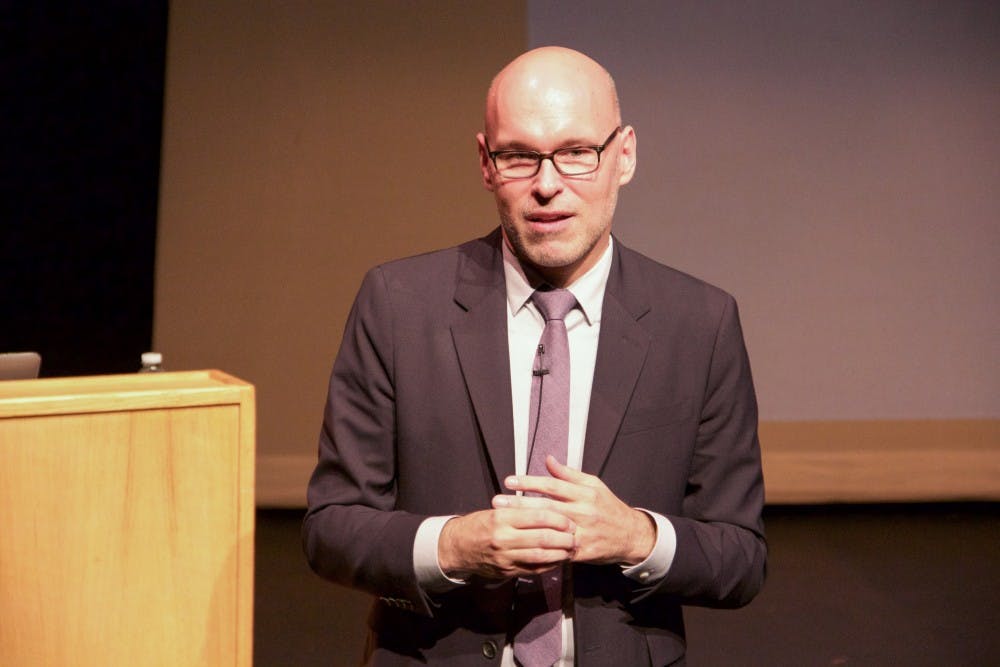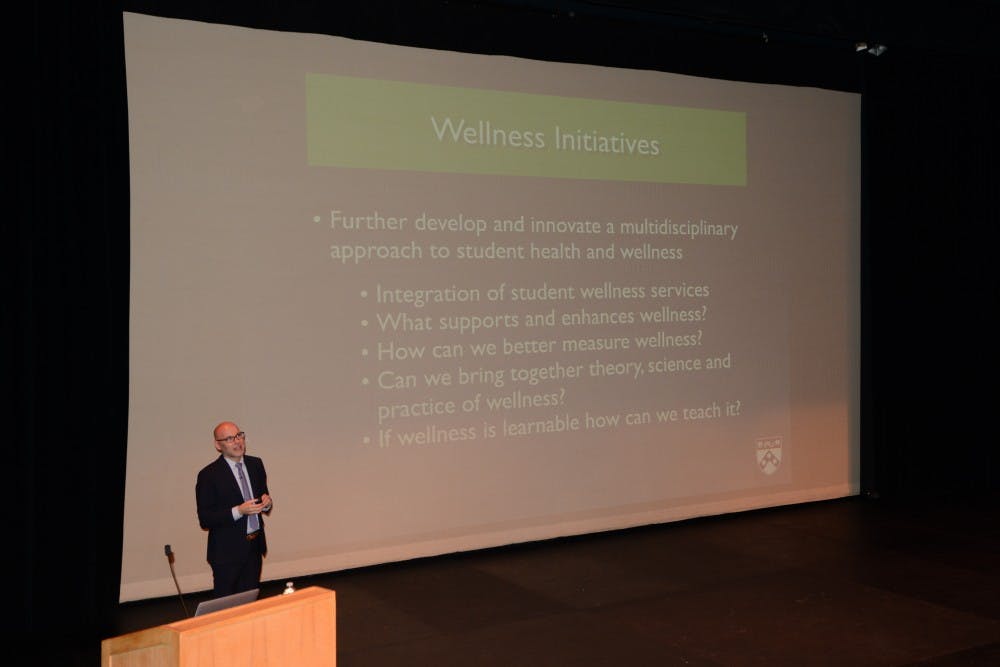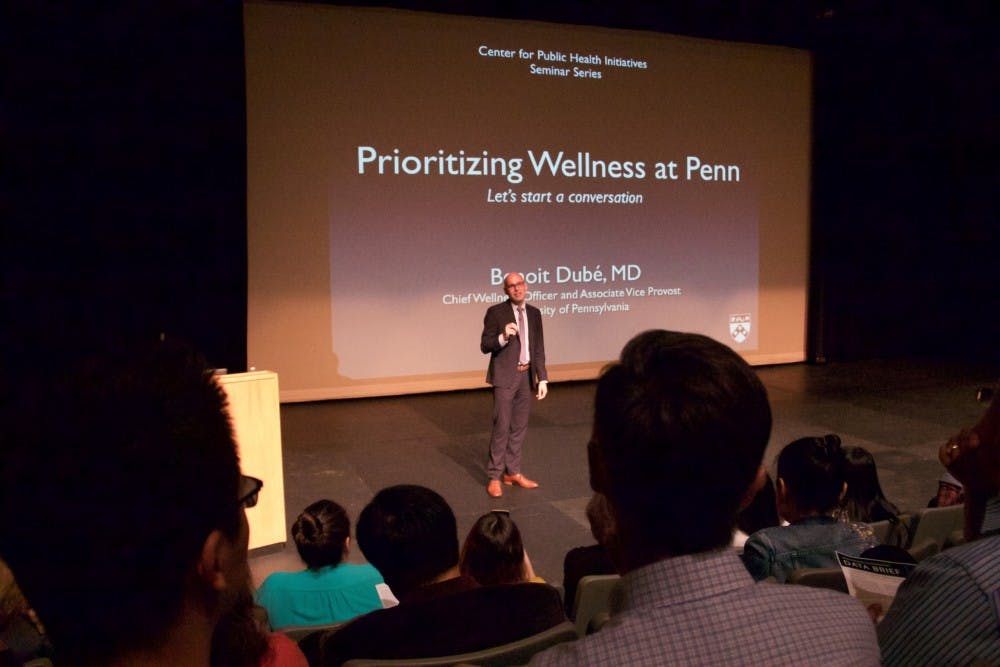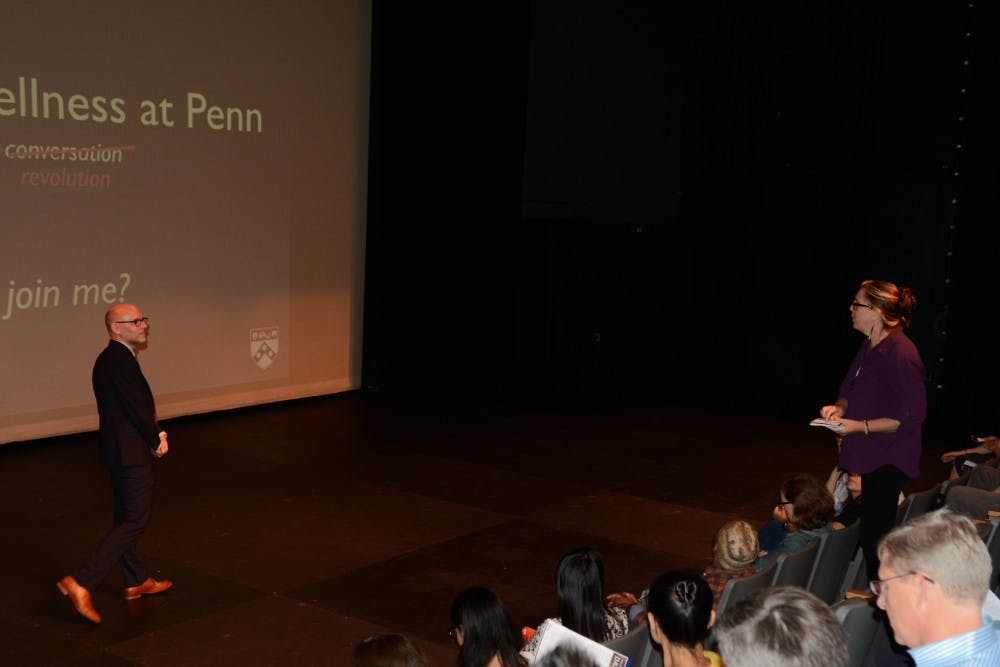
Chief Wellness Officer Benoit Dubé
Credit: Idil DemirdagAt a campus-wide seminar Thursday, Penn’s first Chief Wellness Officer said he is working to give Penn Face a “facelift."
Penn’s first Chief Wellness Officer Benoit Dubé led a seminar on ways to galvanize wellness on campus. Hosted by the Penn Center for Public Health Initiatives, the seminar showcased ways the University’s resources are striving to become more accessible and integrated with student life.
Executive Director of PCPH Initiatives Jennifer Pinto-Martin, who introduced Dubé at the event, said about 170 people attended the seminar, which was followed by a question and answer session.
Dubé posed several ideas that he considers more productive initiatives, such as creating specific wellness discussions and resource-sharing for each year of the undergraduate experience, rather than only having the Thriving at Penn modules during freshman year.
For sophomores, themes may be similar to the Penn Athletics mission, “Champion Your Life,” which focuses on character, humility, enjoyment, community, and ambition. For seniors, specifics may relate to flourishing at Penn and life beyond graduation.
He is also working to integrate Student Wellness Services. Currently, Counseling and Psychological Services and Student Health Services are serviced independently, but Dubé said he hopes to centralize these into one new building that helps students avoid the stigma associated with seeking help from mental health professionals.

The seminar also addressed ideas to curb academic stress. Pinto-Martin said abolishing grades during freshman year has been discussed with Provost Wendell Pritchett and Penn President Amy Gutmann.
The creation of this new chief wellness officer position was established last April in an email from Amy Gutmann to the undergraduate body and oversees a new department at Penn called Student Wellness Services. The purpose of this new position, the first of its kind in the Ivy League, is to coordinate and centralize wellness initiatives across the entire University.
Dubé also mentioned that his role will allow him to centralize wellness initiatives by bringing good practices from certain schools to the broader Penn community. For example, the strict schedules of students in the School of Veterinary Medicine made them unable to visit CAPS, so CAPS clinicians brought services to Penn Vet students at times and places convenient to them. This initiative was later extended to the School of Dental Medicine, Perelman School of Medicine, and Penn Law School.
Dubé broke the seminar into three key areas: the meaning of wellness, the current state of wellness at Penn, and new initiatives.

While Dubé admitted that there are many “deficiencies” in wellness culture at Penn, like the limited staff at CAPS, he does not believe that only meeting these demands is the solution.
Pinto-Martin agreed, and told The Daily Pennsylvanian that the University wants to avoid "just putting a bandaid" on the issue of wellness.
“We can’t just be focused on mental health, ill-health, as the metric," she said. "We really need to think about embracing a whole culture of wellness."
Dubé said he also believes that wellness is teachable. He said he is looking at offering academic credits for learning about wellness, like instituting a class that teaches foundations for wellness to reform Penn's culture.
Graduate student Quratul-Ain Qaiser, who attended the event, said she appreciates the way that Dubé approached wellness.
“Dr. Dubé touched on wellness in a way that kind of makes it real," she said. "It’s not just about feeling good. It’s about actually dealing with things like stress.”
Emma Loh, a first-year student at Penn Dental, said these conversations are especially important at Penn.
“I mean I’ve only been here for three weeks and even I’ve heard about Penn Face," she said.
Loh also felt that Dubé focused on “big campaigns” and administrative initiatives, rather than “concrete ways” to implement these ideas. She also thought a lot of the ideas were focused on undergraduates and underclassmen in the College of Arts and Sciences.
While he did not offer concrete plans, Dubé encouraged partnership among Penn staff, and posed questions for the audience to create new solutions. Dubé also emphasized the role of student leadership in these issues, and believes that change must start with student input.

Dubé fields a question from an audience member.
“It seems like he’s making the effort to reach out to every group on campus, individually, and is open to ideas," Qaiser said.
Dr. Dubé was selected for the position this summer, beating out hundreds of candidates from across the world. Dubé was a professor of clinical psychiatry at the Perelman School of Medicine.
The Daily Pennsylvanian is an independent, student-run newspaper. Please consider making a donation to support the coverage that shapes the University. Your generosity ensures a future of strong journalism at Penn.
Donate



